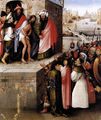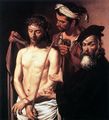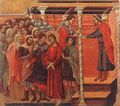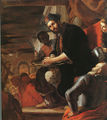Category:Trial of Jesus before Pilate (subject)
The Trial of Jesus before Pilate was an episode in the Passion of Jesus, according to the Gospels of Mark (15:1-20a), Matthew (27:1-2.11-31), Luke (23:1-25), and John (18:28-19:16).
< Passion of Jesus : Triumphal Entry into Jerusalem -- Cleansing of the Temple -- Plot to Kill Jesus -- Anointing of Jesus -- Betrayal of Judas -- Last Supper -- Agony in the Garden -- Arrest of Jesus -- Trial of Jesus before the High Priest -- Peter's Denial -- Trial of Jesus before Pilate -- Trial of Jesus before Herod Antipas -- Barabbas -- Flagellation of Jesus -- Mocking of Jesus -- Way to Golgotha -- Crucifixion of Jesus -- Burial of Jesus >
< Life of Jesus : Nativity of Jesus -- Childhood of Jesus -- Jesus' Hidden Years -- Ministry of Jesus (Parables of Jesus, Miracles of Jesus) -- Passion of Jesus -- Resurrection of Jesus -- Relics of Jesus >
Overview
In the four gospels, Pilate plays a central role in the events surrounding the trial and crucifixion of Jesus of Nazareth, a role confirmed by Tacitus in the only extant reference to Pilate in Roman sources. Each Gospel gives its own distinctive interpretation of the events.
In the Gospel of Mark, Pilate shows an ambiguous attitude toward Jesus. Jesus is silent and does not reply when he is accused of being the King of the Jews. Pilate does not seem to see anything wrong in Jesus, and yet, eager to "please the crowd," released Barabbas, and handed Jesus over to be flogged (see Flagellation of Jesus) and crucified. Before leading Jesus to the place of crucifixion, the Roman soldiers mocked him and put a crown of thorn on him (see Mocking of Jesus).
The Gospel of Matthew follows the order of Mark's narrative, adding some original details. It is the only Gospel to refer to the intervention of Pilate's wife in favor of Jesus and to say that Pilate, after releasing Barabbas, "washed his hands" and blamed "all the people" of Jerusalem and "their children" for their decision--a clear allusion to the future destruction of the city in 70 CE.
In the Gospel of Luke, Pilate is actively engaged in the attempt to save Jesus, whom he regards as innocent. Luke is the only Gospel to include the Trial of Jesus before Herod Antipas. The Flagellation of Jesus is initially presented as an attempt by Pilate to suggest a punishment alternative to crucifixion.
Acts also seems to exonerate Pilate, with the only exception of Acts 4:27, which blames both Pilate and Herod Antipas, "Jews" and "Gentiles" alike, for gathering together against Jesus--a possible relic of the earliest Christian tradition on the death of Jesus.
In the Gospel of John, Jesus is no longer silent as in the other gospels. He and Pilate converse like equals ("What is truth?"). The governor appears as a docile instrument of God's plan, while Jesus is in full control of his destiny. The order of the events is different. In the other gospels, Jesus is flogged and mocked by the Roman soldiers, after the episode of Barabbas, once the Trial before Pilate is over. In John instead, it still happened during the Trial. Pilate shows Jesus again to the Jewish crowd (Ecce Homo), wearing the crown of thorns and the purple robe. A final conversation between the two followed, in which Jesus himself reiterated that the major blame falls upon those who handed him over to Pilate. The governor's final attempt to save Jesus failed before the determination of the Jewish crowd ("We have no king but Caesar").
Later Christian tradition would harmonize the data from the earliest narratives.
Trial of Jesus before Pilate, in scholarly perspective
All Gospel narratives are theologically motivated; they aim to "explain" the significance of the death of Jesus and clear the responsibilities. Similar narratives from Josephus, especially the one involving another Jewish prophet Jesus ben Ananias, may shed light on what happened. First of all, it was not a "trial." Jesus was not a Roman citizen, and as such he had no right to a trial. No formal accusation was necessary, if a person was creating some trouble at the temple, disturbing "peace and order" especially during the major feasts. Flogging was not a punishment but a common method of interrogation. The Roman governor would have not personally interrogated the accused (apart from the linguistic barrier, it would have been degrading of his own dignity), but he would have been informed of the results. He would have taken into consideration some factors-- such as the gravity of the accusations, whether the accused acted alone or had accomplices, and the opinion of the authorities of the temple.
At his arrival in Jerusalem during the Passover Feast, Jesus had created trouble at the Temple. This was more than enough for the Temple authorities to intervene and for the Romans to punish severely the leader of the group. Once Jesus was captured, his sort was sealed. More than a judicial process, we should speak of a police action that led to a summary execution.
Trial of Jesus before Pilate, in ancient sources
Gospel of Mark
Gospel of Mark 15:1-20a (NRSV) -- [1] As soon as it was morning, the chief priests held a consultation with the elders and scribes and the whole council. They bound Jesus, led him away, and handed him over to Pilate. [2] Pilate asked him, "Are you the King of the Jews?" He answered him, "You say so." [3] Then the chief priests accused him of many things. [4] Pilate asked him again, "Have you no answer? See how many charges they bring against you." [5] But Jesus made no further reply, so that Pilate was amazed.
[6] Now at the festival he used to release a prisoner for them, anyone for whom they asked. [7] Now a man called Barabbas was in prison with the rebels who had committed murder during the insurrection. [8] So the crowd came and began to ask Pilate to do for them according to his custom. [9] Then he answered them, "Do you want me to release for you the King of the Jews?" [10] For he realized that it was out of jealousy that the chief priests had handed him over. [11] But the chief priests stirred up the crowd to have him release Barabbas for them instead. [12] Pilate spoke to them again, "Then what do you wish me to do with the man you call the King of the Jews?" [13] They shouted back, "Crucify him!" [14] Pilate asked them, "Why, what evil has he done?" But they shouted all the more, "Crucify him!" [15] So Pilate, wishing to satisfy the crowd, released Barabbas for them; and after flogging Jesus, he handed him over to be crucified.
[16] Then the soldiers led him into the courtyard of the palace (that is, the governor's headquarters); and they called together the whole cohort. [17] And they clothed him in a purple cloak; and after twisting some thorns into a crown, they put it on him. [18] And they began saluting him, "Hail, King of the Jews!" [19] They struck his head with a reed, spat upon him, and knelt down in homage to him. [20] After mocking him, they stripped him of the purple cloak and put his own clothes on him...
Gospel of Matthew
Matthew 27:1-2.11-31 -- [1] When morning came, all the chief priests and the elders of the people conferred together against Jesus in order to bring about his death. [2] They bound him, led him away, and handed him over to Pilate the governor... [11] Now Jesus stood before the governor; and the governor asked him, "Are you the King of the Jews?" Jesus said, "You say so." [12] But when he was accused by the chief priests and elders, he did not answer. [13] Then Pilate said to him, "Do you not hear how many accusations they make against you?" 14 But he gave him no answer, not even to a single charge, so that the governor was greatly amazed.
[15] Now at the festival the governor was accustomed to release a prisoner for the crowd, anyone whom they wanted. 16 At that time they had a notorious prisoner, called Jesus Barabbas. 17 So after they had gathered, Pilate said to them, "Whom do you want me to release for you, Jesus Barabbas or Jesus who is called the Messiah?" 18 For he realized that it was out of jealousy that they had handed him over. 19 While he was sitting on the judgment seat, his wife sent word to him, "Have nothing to do with that innocent man, for today I have suffered a great deal because of a dream about him." 20 Now the chief priests and the elders persuaded the crowds to ask for Barabbas and to have Jesus killed. 21 The governor again said to them, "Which of the two do you want me to release for you?" And they said, "Barabbas." 22 Pilate said to them, "Then what should I do with Jesus who is called the Messiah?" All of them said, "Let him be crucified!" 23 Then he asked, "Why, what evil has he done?" But they shouted all the more, "Let him be crucified!" 24 So when Pilate saw that he could do nothing, but rather that a riot was beginning, he took some water and washed his hands before the crowd, saying, "I am innocent of this man's blood; see to it yourselves." 25 Then the people as a whole answered, "His blood be on us and on our children!" 26 So he released Barabbas for them; and after flogging Jesus, he handed him over to be crucified.
[27] Then the soldiers of the governor took Jesus into the governor's headquarters, and they gathered the whole cohort around him. 28 They stripped him and put a scarlet robe on him, 29 and after twisting some thorns into a crown, they put it on his head. They put a reed in his right hand and knelt before him and mocked him, saying, "Hail, King of the Jews!" 30 They spat on him, and took the reed and struck him on the head. 31 After mocking him, they stripped him of the robe and put his own clothes on him.
Gospel of Luke
Luke 23:1-25 (NRSV) -- [1] Then the assembly rose as a body and brought Jesus before Pilate. [2] They began to accuse him, saying, "We found this man perverting our nation, forbidding us to pay taxes to the emperor, and saying that he himself is the Messiah, a king." 3 Then Pilate asked him, "Are you the king of the Jews?" He answered, "You say so." 4 Then Pilate said to the chief priests and the crowds, "I find no basis for an accusation against this man." 5 But they were insistent and said, "He stirs up the people by teaching throughout all Judea, from Galilee where he began even to this place"... <See Trial of Jesus before Herod Antipas>... [13] Pilate then called together the chief priests, the leaders, and the people, [14] and said to them, "You brought me this man as one who was perverting the people; and here I have examined him in your presence and have not found this man guilty of any of your charges against him. [15] Neither has Herod, for he sent him back to us. Indeed, he has done nothing to deserve death. [16] I will therefore have him flogged and release him." [17] [18] Then they all shouted out together, "Away with this fellow! Release Barabbas for us!" 19 (This was a man who had been put in prison for an insurrection that had taken place in the city, and for murder.) 20 Pilate, wanting to release Jesus, addressed them again; 21 but they kept shouting, "Crucify, crucify him!" 22 A third time he said to them, "Why, what evil has he done? I have found in him no ground for the sentence of death; I will therefore have him flogged and then release him." 23 But they kept urgently demanding with loud shouts that he should be crucified; and their voices prevailed. 24 So Pilate gave his verdict that their demand should be granted. 25 He released the man they asked for, the one who had been put in prison for insurrection and murder, and he handed Jesus over as they wished.
Acts of Apostles
Acts.3:13 -- The God of Abraham, the God of Isaac, and the God of Jacob, the God of our fathers, glorified his servant Jesus, whom you delivered over and denied in the presence of Pilate, when he had decided to release him.
Acts 4:27 -- ...for truly in this city there were gathered together against your holy servant Jesus, whom you anointed, both Herod and Pontius Pilate, along with the Gentiles and the peoples of Israel...
Acts 13:28 -- And though they found in him no guilt worthy of death, they asked Pilate to have him executed.
Gospel of John
John 18:28-19:16 (NRSV) -- [18:28] Then they took Jesus from Caiaphas to Pilate's headquarters. It was early in the morning. They themselves did not enter the headquarters, so as to avoid ritual defilement and to be able to eat the Passover. 29 So Pilate went out to them and said, "What accusation do you bring against this man?" 30 They answered, "If this man were not a criminal, we would not have handed him over to you." 31 Pilate said to them, "Take him yourselves and judge him according to your law." The Jews replied, "We are not permitted to put anyone to death." 32 (This was to fulfill what Jesus had said when he indicated the kind of death he was to die.) 33 Then Pilate entered the headquarters again, summoned Jesus, and asked him, "Are you the King of the Jews?" 34 Jesus answered, "Do you ask this on your own, or did others tell you about me?" 35 Pilate replied, "I am not a Jew, am I? Your own nation and the chief priests have handed you over to me. What have you done?" 36 Jesus answered, "My kingdom is not from this world. If my kingdom were from this world, my followers would be fighting to keep me from being handed over to the Jews. But as it is, my kingdom is not from here." 37 Pilate asked him, "So you are a king?" Jesus answered, "You say that I am a king. For this I was born, and for this I came into the world, to testify to the truth. Everyone who belongs to the truth listens to my voice." 38 Pilate asked him, "What is truth?" After he had said this, he went out to the Jews again and told them, "I find no case against him. 39 But you have a custom that I release someone for you at the Passover. Do you want me to release for you the King of the Jews?" 40 They shouted in reply, "Not this man, but Barabbas!" Now Barabbas was a bandit. [19:1] Then Pilate took Jesus and had him flogged. 2 And the soldiers wove a crown of thorns and put it on his head, and they dressed him in a purple robe. 3 They kept coming up to him, saying, "Hail, King of the Jews!" and striking him on the face. 4 Pilate went out again and said to them, "Look, I am bringing him out to you to let you know that I find no case against him." 5 So Jesus came out, wearing the crown of thorns and the purple robe. Pilate said to them, "Here is the man!" 6 When the chief priests and the police saw him, they shouted, "Crucify him! Crucify him!" Pilate said to them, "Take him yourselves and crucify him; I find no case against him." 7 The Jews answered him, "We have a law, and according to that law he ought to die because he has claimed to be the Son of God." 8 Now when Pilate heard this, he was more afraid than ever. 9 He entered his headquarters again and asked Jesus, "Where are you from?" But Jesus gave him no answer. 10 Pilate therefore said to him, "Do you refuse to speak to me? Do you not know that I have power to release you, and power to crucify you?" 11 Jesus answered him, "You would have no power over me unless it had been given you from above; therefore the one who handed me over to you is guilty of a greater sin." 12 From then on Pilate tried to release him, but the Jews cried out, "If you release this man, you are no friend of the emperor. Everyone who claims to be a king sets himself against the emperor." 13 When Pilate heard these words, he brought Jesus outside and sat on the judge's bench at a place called The Stone Pavement, or in Hebrew Gabbatha. 14 Now it was the day of Preparation for the Passover; and it was about noon. He said to the Jews, "Here is your King!" 15 They cried out, "Away with him! Away with him! Crucify him!" Pilate asked them, "Shall I crucify your King?" The chief priests answered, "We have no king but the emperor." 16 Then he handed him over to them to be crucified.
Trial of Jesus before Pilate, in the arts
The Christian iconographic tradition harmonizes the data from the four "canonical" gospels to form a single narrative, including details that are unique to different gospels, such as Pilate Washing His Hands (from Matthew), or Jesus Conversing with Pilate and the Ecce Homo (from John). Ecce Homo is also the traditional name given to Portraits of the Suffering Jesus, which in this Encyclopedia are listed separately among the other portraits of Jesus; see Jesus of Nazareth.
Message of Pilate' Wife
Jesus before Pilate
Flagellation and Mocking of Jesus
These scene, which in Mark and Matthew happened after the Trial of Jesus before Pilate, are located in the Gospel of John during the Trial.
Ecce Homo
Pilate Washing His Hands
Related categories
External links
- [ Wikipedia]
Pages in category "Trial of Jesus before Pilate (subject)"
The following 21 pages are in this category, out of 21 total.
1
- Pilate Washing His Hands (1311 Duccio), art
- Pilate's First Interrogation of Christ (1311 Duccio), art
- Ecce Homo (1476 Bosch), art
- Ecce Homo (1500 Mantegna), art
- Pilate Washing His Hands (1518 Altdorfer), art
- Christ before Pilate (1525 Pontormo), art
- Ecce Homo (1526 Correggio), art
- Ecce Homo (1605 Caravaggio), art
- Ecce Homo (1607 Cigoli), art
- Pilate Washing His Hands (1626 Lievens), art
- Ecce Homo (1650c Champaigne), art
- Pilate Washing His Hands (1663 Preti), art
- Ecce Homo (1850 Dumier), art
- Christ before Pilate (1881 Munkácsy), art
- Quod Est Veritas? Christ and Pilate (1890 Ge), art
- Golgotha (1893 Ge), art
- Message of Pilate's Wife (1894 Tissot), art
- Pilate Washing His Hands (1894 Tissot), art
- Ecce Homo (1896 Munkácsy), art
- Ecce Homo (1925 Corinth), art
Media in category "Trial of Jesus before Pilate (subject)"
This category contains only the following file.
- 1891 * Ciseri (art).png 779 × 600; 734 KB

















